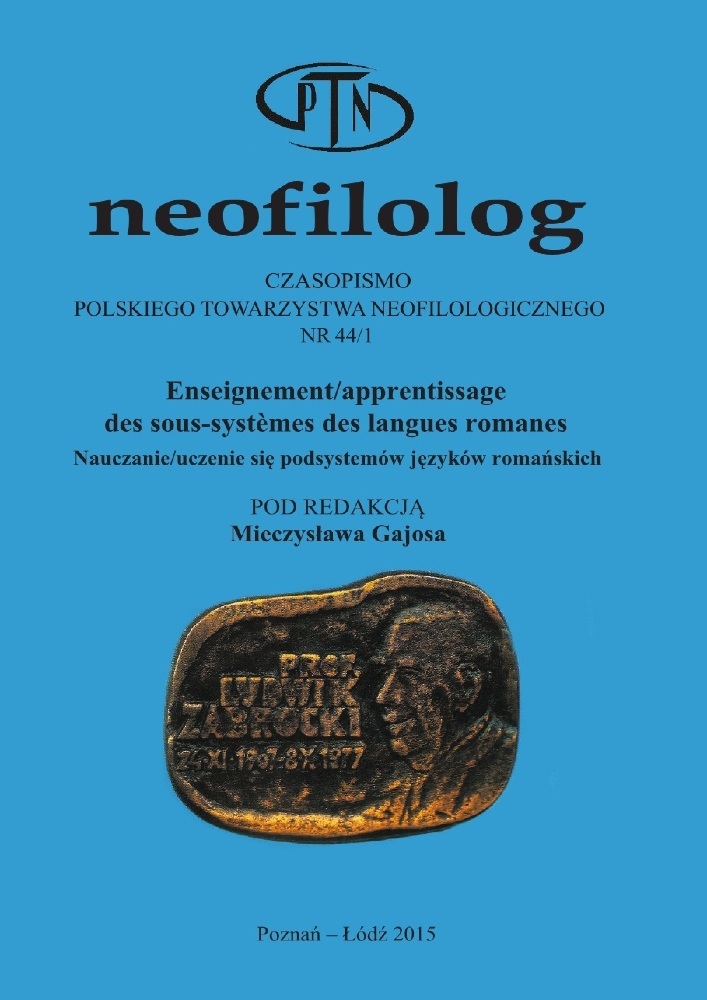Abstract
The present analysis aims at systematizing sparse remarks revolving around teaching of languages for special purposes (LSP). Detailed data were collected by observation within Polish academic circles. More precisely, they are based on past working experience gained among stu-dents boasting a high level of language proficiency. Apart from general tendencies, more streamlined requirements have been formulated on a par with their particular consequences.References
Altieri Biagi, M. L. 1970. Guglielmo Volgare. Studio sul lessico della medicina medioevale. Bologna: Forni.
Balboni, P. E. 2000. Le microlingue scientifico professionali. Natura e insegnamento. Torino: Utet.
Balboni, P.E. 2008. «Linguistica acquisizionale e glottodidattica». In: Dagli studi sulle sequenze di acquisizione alla classe di italiano L2. Atti del Convegno-seminario Bergamo, 19-21 giugno, R.Grassi (a cura di). Perugia: Guerra. pp: 23-34.
Beccaria, G. L. 1988. Italiano antico e nuovo. Milano: Garzanti libri.
Borello, E. 2001. Le parole dei mestieri. Gergo e comunicazione. Firenze: Alinea editrice.
Cabré, M-T. 1998. La terminologie. Théorie, méthodes et applications. Ottava: Les Presses de l’Université d’Ottava.
Cavagnoli, S. 2001. «Quale metodo per la lezione del linguaggio specialistico». In: Language for Special Purposes: Prospetives for the New Millenium. Tom 1. Red. Felix Mayer. Tubingen: GunterNarr Verlag. pp: 375-383.
Cortelazzo, M. A. 1988. «Le lingue speciali» . In: Holtus Günter – Metzeltin Michael – Schmitt Christian (a cura di) Italienisch: Fachsprachen / Lingue speciali in Lexicon der Romanistischen Linguistik. Tübingen: Niemayer.
De Mauro, T. 1988 «Linguaggi scientifici e lingue storiche». In: A.R. Guerriero (a cura di) L’educazione linguistica e i linguaggi delle scienze. Firenze: La Nuova Italia.
De Saussure, F. 1989. Cours de linguistique générale. Édition critique par Rudolf Engler. Tom 1. Wiesbaden: Otto Harrassowitz.
Calefato, P. 2004. Nel linguaggio. Materiali per discipline di confine. Roma: Meltemi Editore.
Federspil, G. 1980. I fondamenti del metodo in medicina clinica e sperimentale. Padova: Piccin Editore.
Ferioli, A. 1998. «Insegnare italiano per fini specifici: motivazione e apprendimento cooperativo». In: Quaderns d’Italia 3. pp: 135-147.
Freddi, G. 1994. Glottodidattica: fondamenti, metodi e tecniche. Torino: UTET Libreria.
Gotti, M. 1991. I linguaggi specialistici. Caratteristiche linguistiche e criteri pragmatici. Firenze: La Nuova Italia.
Serianni, L. 2006. «Terminologia medica: qualche considerazione tra italiano, francese e spagnolo». In: Terminologie specialistiche e tipologie testuali. Prospettive interlinguistiche. Roma: Eds. M. T. Zanola. pp: 7-31.
Sula, A. 2009. «Riflessioni sulle problematiche dell’Italiano L2 per scopi speciali». In: Linguistic and Communicative Performance Journal, Volume 2/2. Tirana. pp.39-48
Villa, M. L. 2013. Linguaggio scientifico. Nessuna è come la madre. http://is.pearson.it/magazine/linguaggio-scientifico-nessuna-e-come-la-madre/ 02.04.2015
License
Copyright (c) 2019 Neofilolog

This work is licensed under a Creative Commons Attribution-NoDerivatives 4.0 International License.
Authors
Authors of texts accepted for publication in Neofilolog are required to complete, sign and return to the Editorial team’s office the Agreement for granting a royalty-free license to works with a commitment to grant a CC sub-license.
Under the agreement, the authors of the texts published in Neofilolog grant Adam Mickiewicz University in Poznań a non-exclusive, royalty-free license and authorize the use of Attribution-NoDerivatives 4.0 International (CC BY-ND 4.0) Creative Commons sub-license.
The authors retain the right to the free disposal of the work.
Users
Interested Internet users are entitled to use works that have been published in Neofilolog since 2017, under the following conditions:
▪ attribution – obligation to provide, together with the distributed work, information about the authorship, title, source (link to the original work, DOI) and the license itself.
▪ no derivatives – the work must be preserved in its original form. Without the author's consent, it is not possible to distribute the modified work in the form of translations, publications, etc.
Copyrights are reserved for all texts published since 2017.
Miscellaneous
Adam Mickiewicz University in Poznań retains the property right as a whole (layout, graphic form, title, cover design, logo etc.).
